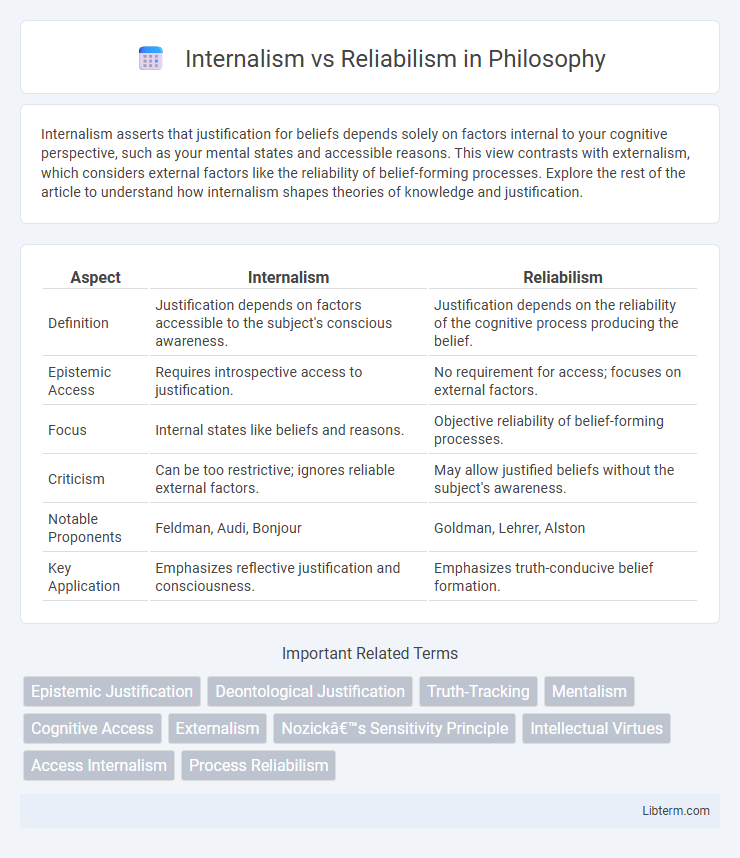Internalism asserts that justification for beliefs depends solely on factors internal to your cognitive perspective, such as your mental states and accessible reasons. This view contrasts with externalism, which considers external factors like the reliability of belief-forming processes. Explore the rest of the article to understand how internalism shapes theories of knowledge and justification.
Table of Comparison
| Aspect | Internalism | Reliabilism |
|---|---|---|
| Definition | Justification depends on factors accessible to the subject's conscious awareness. | Justification depends on the reliability of the cognitive process producing the belief. |
| Epistemic Access | Requires introspective access to justification. | No requirement for access; focuses on external factors. |
| Focus | Internal states like beliefs and reasons. | Objective reliability of belief-forming processes. |
| Criticism | Can be too restrictive; ignores reliable external factors. | May allow justified beliefs without the subject's awareness. |
| Notable Proponents | Feldman, Audi, Bonjour | Goldman, Lehrer, Alston |
| Key Application | Emphasizes reflective justification and consciousness. | Emphasizes truth-conducive belief formation. |
Introduction to Internalism and Reliabilism
Internalism asserts that justification for knowledge depends on factors accessible to a person's conscious awareness, emphasizing introspective access to reasons. Reliabilism holds that justification relies on the reliability of the cognitive processes that produce beliefs, regardless of the subject's awareness. These contrasting epistemological theories address the source and nature of justification in knowledge acquisition.
Defining Internalism in Epistemology
Internalism in epistemology asserts that the justification of a belief depends solely on factors accessible to the thinker's conscious awareness, emphasizing introspective access to reasons or evidence. This position holds that justifiers must be internally available to the subject to validate knowledge claims, contrasting with externalist views that allow justification based on external factors independent of the subject's perspective. Internalism prioritizes mental states, such as beliefs and justificatory reasons, as the core criteria for epistemic justification.
Understanding Reliabilism: An Overview
Reliabilism, a prominent theory in epistemology, defines knowledge as true belief produced by reliable cognitive processes, emphasizing the externalist perspective. It contrasts with internalism by focusing on the objective reliability of the belief-forming mechanism rather than the subject's introspective access to justificatory reasons. Key proponents like Alvin Goldman argue that a belief is justified if it is generated through processes that consistently yield truth, highlighting the significance of external factors in epistemic justification.
Core Differences Between Internalism and Reliabilism
Internalism asserts that justification for beliefs depends on factors internal to a thinker's perspective, emphasizing accessible mental states and evidence. Reliabilism holds that justification is determined by the reliability of the belief-forming process, regardless of the thinker's awareness or access to the justificatory grounds. Core differences revolve around internal access to evidence in Internalism versus external process reliability in Reliabilism.
Key Arguments Supporting Internalism
Internalism emphasizes that epistemic justification depends on factors accessible to a subject's consciousness, ensuring that individuals can reflectively assess their beliefs. Key arguments supporting internalism highlight the importance of cognitive access, asserting that without access to justificatory reasons, one cannot be truly justified in holding a belief. This perspective maintains that epistemic responsibility requires awareness of the internal state that grounds a belief, distinguishing it from reliabilist reliance on external, often non-transparent, reliability factors.
Main Objections to Reliabilism
Main objections to reliabilism include the generality problem, which questions how to specify the relevant reliability of a belief-forming process among many possible descriptions, leading to ambiguity in defining justification. Critics also point to the externalism challenge, arguing that reliabilism relies on factors beyond an individual's cognitive access, potentially disconnecting justification from what the subject can know. Lastly, the problem of epistemic luck highlights how a belief can be formed through a reliable process yet still be true by accident, undermining the connection between reliability and knowledge.
Notable Thought Experiments in the Debate
Notable thought experiments in the Internalism vs Reliabilism debate include the "Brain in a Vat" scenario, which challenges Internalism by questioning how one can justify beliefs without reliable access to external reality. The "Fake Barn County" example critiques Reliabilism by presenting cases where beliefs are formed through reliable processes but still fail to be knowledge due to environmental deception. These experiments highlight the tension between the need for accessible justification and reliance on truth-conducive processes in epistemology.
Practical Implications for Justification Theory
Internalism emphasizes that justifying a belief requires access to its supporting reasons, which reinforces the agent's reflective awareness and promotes self-evaluation in knowledge acquisition. Reliabilism asserts that justification depends on the reliability of the belief-forming process, thus prioritizing objective success over the agent's introspective access. Practical implications for justification theory include the tension between demanding cognitive accessibility for justification under internalism versus valuing external truth-conducive procedures in reliabilism, influencing debates on epistemic responsibility and the standards for rational belief.
Contemporary Challenges and Responses
Contemporary challenges to Internalism question its demand for accessible justification in epistemic justification, highlighting difficulties in accounting for reliable belief formation without explicit awareness. Reliabilism faces critiques for potentially endorsing epistemic luck and the problem of new evil demons, undermining the link between truth and justification. Responses include hybrid theories integrating internalist access with externalist reliability and refined accounts addressing epistemic luck through safety and sensitivity conditions.
Conclusion: Bridging Internalism and Reliabilism
Internalism emphasizes access to justifying reasons within an individual's cognitive perspective, while Reliabilism prioritizes the external reliability of belief-forming processes as a foundation for knowledge. Bridging these epistemological theories involves integrating internal access to justifications with the objective reliability of cognitive mechanisms, creating a more comprehensive understanding of epistemic justification. This synthesis enhances the evaluation of knowledge claims by combining subjective justification conditions with external success criteria.
Internalism Infographic

 libterm.com
libterm.com